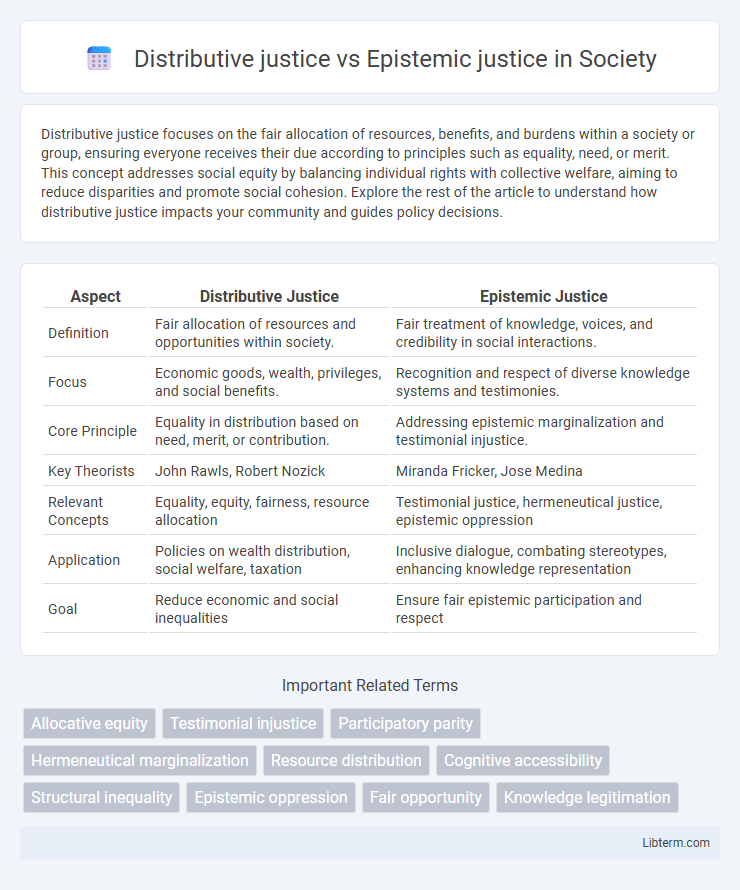Distributive justice focuses on the fair allocation of resources, benefits, and burdens within a society or group, ensuring everyone receives their due according to principles such as equality, need, or merit. This concept addresses social equity by balancing individual rights with collective welfare, aiming to reduce disparities and promote social cohesion. Explore the rest of the article to understand how distributive justice impacts your community and guides policy decisions.
Table of Comparison
| Aspect | Distributive Justice | Epistemic Justice |
|---|---|---|
| Definition | Fair allocation of resources and opportunities within society. | Fair treatment of knowledge, voices, and credibility in social interactions. |
| Focus | Economic goods, wealth, privileges, and social benefits. | Recognition and respect of diverse knowledge systems and testimonies. |
| Core Principle | Equality in distribution based on need, merit, or contribution. | Addressing epistemic marginalization and testimonial injustice. |
| Key Theorists | John Rawls, Robert Nozick | Miranda Fricker, Jose Medina |
| Relevant Concepts | Equality, equity, fairness, resource allocation | Testimonial justice, hermeneutical justice, epistemic oppression |
| Application | Policies on wealth distribution, social welfare, taxation | Inclusive dialogue, combating stereotypes, enhancing knowledge representation |
| Goal | Reduce economic and social inequalities | Ensure fair epistemic participation and respect |
Introduction to Distributive and Epistemic Justice
Distributive justice concerns the fair allocation of resources, benefits, and burdens within a society, ensuring equitable access based on need, effort, or contribution. Epistemic justice addresses the fairness in knowledge distribution, emphasizing the recognition and inclusion of diverse perspectives and credible contributions in social and intellectual contexts. Together, these concepts highlight the importance of both material equity and justice in knowledge recognition for a balanced and just society.
Defining Distributive Justice
Distributive justice concerns the equitable allocation of resources, opportunities, and wealth across members of a society, ensuring fairness based on principles like equality, need, or merit. It addresses material and social goods distribution to reduce disparities and uphold social cohesion. Epistemic justice, by contrast, focuses on fairness in knowledge production and recognition, examining how marginalized voices are heard and respected within epistemic communities.
Understanding Epistemic Justice
Epistemic justice addresses fairness in knowledge practices, emphasizing the importance of recognizing and valuing diverse perspectives and sources of knowledge. It combats epistemic injustices such as testimonial injustice, where a speaker's credibility is unfairly diminished, and hermeneutical injustice, where gaps in collective understanding hinder marginalized groups from making sense of their experiences. Understanding epistemic justice involves promoting inclusive knowledge production and ensuring equitable participation in epistemic communities.
Historical Perspectives on Justice Theories
Distributive justice, rooted in historical theories from Aristotle to Rawls, focuses on the equitable allocation of resources and opportunities within societies. Epistemic justice, emerging prominently from contemporary scholars like Miranda Fricker, addresses the fairness in knowledge distribution, emphasizing the recognition and inclusion of marginalized voices in epistemic practices. Historically, justice theories evolved from material fairness to incorporate cognitive and testimonial equity, reflecting broader social and ethical transformations.
Core Principles: Distribution vs. Recognition
Distributive justice centers on the equitable allocation of resources, opportunities, and wealth to ensure fairness across society, emphasizing the fair distribution of tangible and intangible goods. Epistemic justice, by contrast, prioritizes recognition, addressing the ways in which individuals or groups are acknowledged as credible knowers and contributors to knowledge systems. The core distinction lies in distributive justice's focus on material equity, whereas epistemic justice focuses on the fair treatment and respect of knowledge sources and communicative interactions.
Key Thinkers and Philosophical Foundations
Distributive justice, grounded in the works of John Rawls and Robert Nozick, emphasizes fair allocation of resources and opportunities based on principles of equality and entitlement, with Rawls advocating for the "veil of ignorance" and Nozick promoting minimal state interference. Epistemic justice, developed by Miranda Fricker, centers on fairness in knowledge practices, highlighting testimonial injustice and hermeneutical injustice where marginalized groups face systematic exclusion from credible knowledge production. Both theories challenge systemic inequalities, but distributive justice primarily addresses material conditions while epistemic justice tackles recognition and credibility in epistemic communities.
Overlapping Concerns and Divergences
Distributive justice and epistemic justice both address fairness but focus on different domains: resource allocation versus knowledge recognition and credibility. Overlapping concerns include the equitable treatment of marginalized groups and rectifying systemic inequalities that affect access to both material goods and epistemic participation. Divergences arise as distributive justice centers on tangible goods distribution, while epistemic justice emphasizes fair treatment in knowledge-related processes like testimony and understanding.
Practical Implications in Society
Distributive justice ensures equitable allocation of resources and opportunities, addressing material inequalities that impact social welfare and economic stability. Epistemic justice emphasizes fair recognition and inclusion of diverse knowledge systems, fostering trust and mitigating marginalization in decision-making processes. Integrating both principles promotes social cohesion by balancing material fairness with the validation of marginalized perspectives in policymaking and community engagement.
Contemporary Debates and Criticisms
Contemporary debates on distributive justice emphasize equitable allocation of resources and opportunities to address systemic inequalities, while epistemic justice critiques highlight how knowledge production often marginalizes certain groups, reinforcing power imbalances. Critics argue that traditional distributive frameworks overlook epistemic dimensions such as testimonial injustice and hermeneutical gaps, which affect marginalized communities' participation in social decision-making. Recent scholarship calls for integrated approaches that combine economic redistribution with recognition of diverse epistemic contributions to achieve comprehensive social justice.
Toward a Synthesis: Integrating Justice Frameworks
Distributive justice emphasizes the equitable allocation of resources and opportunities, while epistemic justice focuses on the fairness in the recognition and validation of knowledge and voices, particularly those of marginalized groups. Integrating these frameworks involves acknowledging that material inequities and epistemic marginalization often intersect, necessitating a holistic approach to justice that addresses both economic disparities and injustices in knowledge production and representation. This synthesis promotes policies and practices that ensure fair resource distribution alongside inclusive recognition and participation in knowledge processes.
Distributive justice Infographic

 libterm.com
libterm.com